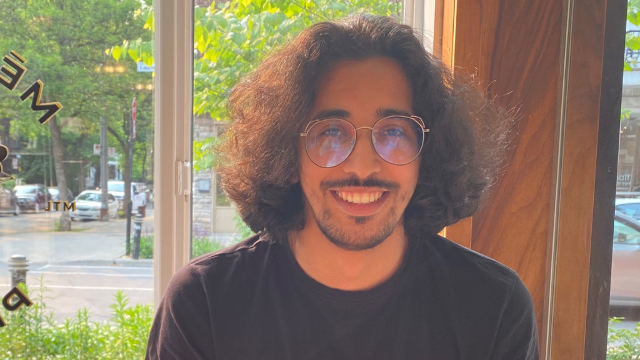Oussama Boussif, a graduate of the Master MVA (Mathematics, Vision, Learning) program at École normale supérieure Paris-Saclay, has been a doctoral student at Mila - Quebec Artificial Intelligence Institute since January 2023.
You studied at CentraleSupélec, then pursued the MVA master's at ENS Paris-Saclay. What kind of alumni are you?
Having completed only one year of master's at ENS Paris-Saclay, I didn't think I would benefit from alumni status. It was a pleasant surprise. I thought it was reserved for normaliens following the 4-year curriculum. During my master's, I hardly set foot at ENS because, with the pandemic, most classes were remote. Before that, I did preparatory classes at Lydex: LYCÉE D’EXCELLENCE DE BENGUERIR in Morocco, then I joined CentraleSupélec. Initially interested in research in physics, I later shifted towards artificial intelligence. Since I always wanted to pursue research, ENS was the Graal.
You chose to go abroad for your thesis. Why?
The MVA master's allowed me to pursue a thesis at MILA, which brings together over 1000 researchers. We work in areas such as health, environment, climate change, and AI ethics. The laboratory was founded by Professor Yoshua Bengio, a pioneer in deep learning at the University of Montreal. Thanks to early results, funding arrived quickly, and teams were strengthened. MILA is now a non-profit organization with significant academic collaborations with the University of Montreal, McGill University, Polytechnique Montréal, HEC Montréal, and numerous corporate partners. MILA hosts research master's students, doctoral and post-doctoral researchers, as well as professional master's students with a more applied focus on the needs of partner companies. There's also a startup support program.
Could you briefly describe the topic of your thesis?
In my research group, we focus on artificial intelligence for scientific discovery. For example, algorithms capable of reasoning like humans and helping formulate theories, formulas, and mathematical laws from data. We haven't fully achieved this yet, but progress is swift. In terms of applications, there are two main axes: discovering new drugs and materials that emit less carbon to contribute to the fight against climate change. Currently, I am specifically working on accelerating methods for physical simulation. For instance, the application on your smartphone that allows you to check the weather uses enormous computation graphs. The goal with artificial intelligence is to be more precise, faster, and, if possible, less energy-intensive.
In your opinion, what are the challenges of AI for scientific research?
Autonomous AI could assist us in better research by eliminating tedious or repetitive tasks. However, there is an existential risk for humans. I am concerned about the advanced computing capacity of AI, which could be used for terrorist purposes, for example. Intelligent systems that design algorithms and choose their own objectives might not necessarily include human survival in their parameters. AutoGPT already executes objectives one by one. There are still limits, of course, but progress is rapid. Yoshua Bengio has stated that he would have prioritized security over utility if he could have anticipated how quickly artificial intelligence would evolve. There are already nuclear risks, climate risks, and we might be creating a new major risk. The idea that an AI asked to solve climate change would do so by eliminating the main problem, the human species, might not remain science fiction for long.
What is your plan after completing your doctorate?
I don't know yet. What struck me when I arrived at MILA is the collaborative, almost communal life. You can freely discuss with researchers to enrich your thinking. Moreover, life in Montreal is more peaceful than in Paris. I easily integrated into the French and Moroccan communities. I will probably return to Europe, maybe Switzerland.
Can your experience abroad inspire current students?
I, myself, met alumni from CentraleSupelec who had come to MILA, and it excited me. Sharing one's experience is very important. I am really delighted to have done the MVA master's, known to be one of the best, if not the best in the world; it clearly opened the door to the doctoral program at MILA. At ENS Paris-Saclay, we have access to excellent researchers, with affordable tuition fees, which is an invaluable opportunity. Being part of the extended network of Normaliens is obviously very interesting for my career as a researcher.

Comments0
Please log in to see or add a comment
Suggested Articles



